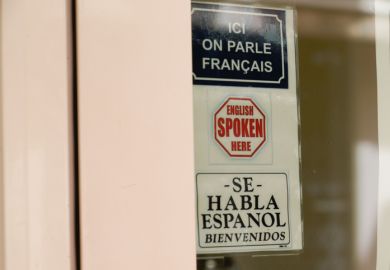AC Grayling is an undeniably engaging speaker.
The founder and master of the New College of the Humanities gave an eloquent and well-rehearsed defence of the importance of humanities study at the Reinventing Higher Education conference in Madrid yesterday; a speech that borrowed heavily from addresses he has made previously, but which arguably benefitted as a result. The delivery was superb, and the warm reaction well-earned.
At times, his keynote address at IE University felt like a game of philosopher bingo. I’d jotted down a few names before we started, and ticked them off as we went. Camus, Plato, Aristotle were all present and correct. “House!”, I almost shouted.
Entertaining as the speech was, it was in the question and answer session that things got really interesting (from a higher education journalist’s perspective, at least).
I wanted to ask Grayling about the recent news that his college – often painted as an Oxbridge-style finishing school for those who can afford the £18,000 a year fees – has turned to Southampton Solent University to validate its degrees.
Had he seen something in Solent that meant it was the institution of choice for his own college? Early signs suggested not: an email newsletter distributed by the New College of the Humanities announced that it was to award its own degrees, but made no mention of the Hampshire institution that, until 2005, had its own degrees validated by Nottingham Trent University.
There is now a mention of the Solent agreement on the New College of the Humanities website (you’ll need to scroll down), but it seemed to be an agreement reached out of necessity rather than desire.
Answering my question, Grayling confirmed as much.
“With the regulatory regime, we are bound by statute to enter into an agreement with somebody, the Russell Group doesn’t do it,” he said. “The universities that do do it tend to be at the other end of the spectrum.
“So it is just a necessity, and we carefully chose a partner that had some synergies with us – there are some things that they do that we find interesting, but because it has to be done, it has to be done, so that’s the answer to that.”
The truth is, it may not have to be done for very much longer. Jo Johnson, the universities minister, has said the validating model “is quite frankly anti-competitive”, and an institution such as the New College would potentially be one of the high-profile beneficiaries of any reforms to this approach. Until then, though, institutions have to jump through the hoops.
Grayling also confirmed that the partnership means that his college now has tier four visa status, meaning it can begin recruiting overseas students. He had talked about the importance of building an endowment, and I wondered whether he intended to do this by charging high fees to international students – a well -established money-making tactic elsewhere in the UK higher education sector.
Not at the New College, though, it seems.
“Our overseas students… will not pay very much more than our home students,” Grayling said. “In a lot of places overseas student fees are very much higher than home student fees, I think that’s not right, it’s not just, and it’s not justifiable either.”
He conceded that there were “slightly greater administration costs” for international recruits, given the “duty imposed by the home office to monitor overseas students.”
“But we don’t intend to charge very much more than our home students,” he concluded.
Grayling has big plans for the New College of the Humanities. He believes that the UK’s “extremely restrictive regime” is set to change – perhaps a reference to the mooted contents of the upcoming HE Green Paper, which may look to advance market entry in the UK.
“When that changes…we can innovate even more. We have big ideas about what we would like to do…and as soon as we have the opportunity to do it we will,” he said.
Register to continue
Why register?
- Registration is free and only takes a moment
- Once registered, you can read 3 articles a month
- Sign up for our newsletter
Subscribe
Or subscribe for unlimited access to:
- Unlimited access to news, views, insights & reviews
- Digital editions
- Digital access to THE’s university and college rankings analysis
Already registered or a current subscriber?





